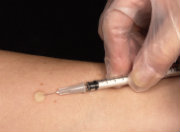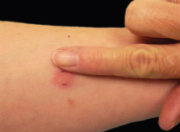
A Tuberculosis (TB) skin test will tell you if you have been infected with the TB germs. A TB skin test is not a vaccine.
Medically necessary TB skin tests and documentation are covered under the Ontario Health Insurance Plan (OHIP). These include testing for:
TB skin tests and documentation are also covered under the Ontario Health Insurance Plan (OHIP) for:
The cost of a TB skin test varies. Call your health care provider, local walk-in-clinic or community health centre and ask about the cost. If you are a student, check with your school’s health services department about getting a TB skin test.
For more information regarding your OHIP coverage, call the Ministry of Health and Long-Term Care INFO line: 1-800-664-8988.
Toronto Public Health provides free TB skin tests:
Toronto Public Health does not provide TB skin tests for people who need them as a requirement for employment or volunteering.
You can get a TB skin test for work, school or volunteering at:
Call ahead to make an appointment.

The TB skin test must be checked after 48-72 hours after it is injected. A positive skin test shows you have TB infection (LTBI). More tests will be needed to screen for TB disease and make sure that the TB bacteria is not active and making a person sick. These tests usually include a check-up by a health care provider for signs and symptoms of active TB disease, a chest x-ray and sputum collection.

The TB skin test must be checked after 48-72 hours after it is injected. A positive skin test shows you have TB infection (LTBI). More tests will be needed to screen for TB disease and make sure that the TB bacteria is not active and making a person sick. These tests usually include a check-up by a health care provider for signs and symptoms of active TB disease, a chest x-ray and sputum collection.
Once your family doctor determines that you do not have active TB disease, ask about medication to prevent getting active TB disease in the future. This medication is free through Toronto Public Health.
Bacille Calmette-Guerin (BCG) is a vaccine for tuberculosis (TB). It was first used in 1921 and is still used today in many countries with high rates of TB, where there is a higher risk of getting TB. Its use has been discontinued in many industrialized countries because of low TB rates.
In Canada, the vaccine is currently only given to selected groups of people who still have high rates of TB, e.g. newborns and infants living on First Nation reserves and in Inuit communities.
The BCG does not provide lifelong protection from TB infection or TB disease. The BCG is most protective against certain types of TB in babies and young children. However, as a person gets older, the protective effects of the vaccine decreases with time.
Getting the BCG vaccine as a baby will not result in a positive TB skin test as an adult. It is okay to get a TB skin test can even though a person has had a BCG vaccination in the past.
A new blood test called the Interferon Gamma Release Assay (IGRA) can be used to see if a person has the TB bacteria. Two IGRA blood tests are now licensed for use in Canada: Quantiferon TB Gold and T-SPOT TB. However, neither is covered under the Ontario health insurance plan (OHIP). Right now, only Quantiferon TB Gold testing can be done on a limited basis through Gamma-Dynacare Medical or Life Labs Laboratories.
For more information about the IGRA, please see our health professional website.